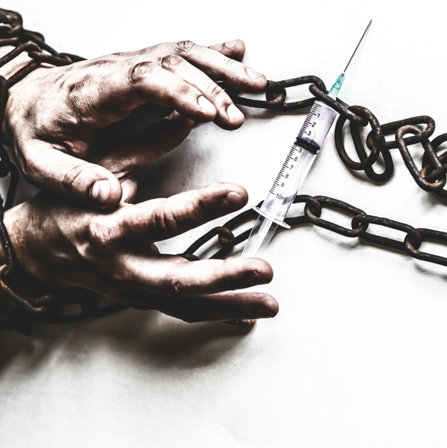Drug Addiction—Enslaved to a Substance

To be addicted to a substance is truly to be enslaved by that substance. The substance controls you. But that also means the people who provide that substance control you, in a way. And you are also a slave to seeking money so that you can buy the substance, even if that means stealing to get the money. You essentially become enslaved to everything having to do with getting and using that substance. The substance (and everything connected to it) controls you.
Not long ago, I wrote an article about the connection between drug addiction and the brutal reality that is the human trafficking industry. I had been inspired to write that article after I’d met with a local human rights activist who was campaigning for freedom for all human beings from all corners of the Earth.
That meeting led me to write about drug addiction and human trafficking and how human trafficking is merely another term for slavery. In that article, I talked about how drugs are often used to coerce people into human trafficking. Furthermore, a lot of victims of human trafficking use drugs as a means of coping with the horrors that exist in their day-to-day lives.
Today, I was deep in thought about the repulsive subject of drugs being used as a means of coercing people into human trafficking, slave labor, the sex trade, etc. Then I realized that, in so many ways, drug addiction is itself a form of slavery. Drug addiction is a condition in which someone is physically and mentally dependent on a substance, addicted to the point where they quite literally cannot stop using that substance without intervention and help from others.
And that means that people who get pulled into human trafficking, the sex trade, slave labor, etc., are doubly enslaved. They are enslaved to both their masters, i.e., the human masters and drugs. It’s a horrific condition to be in.
Addicts Often Relate Addiction to Enslavement
A cursory Google search reveals many reflections from recovered addicts all across the country, individuals who associate their past drug habits with total enslavement to a substance.
In its simplest form, addiction is an enslavement of the body, mind, and of one’s own free will.
Some experts on the subject of addiction have already drawn the line between addiction and enslavement. There have even been books written about it. One of these books is Dr. Robert L. Dupont’s book, Chemical Slavery: Understanding Addiction and Stopping the Drug Epidemic which describes addiction and recovery from it as follows: “Recovery is a better self that is enhanced by the challenging work of emancipation from chemical slavery. In the same way, families that deal successfully with addiction are enhanced by their struggles.”
“Recovery is a better self that is enhanced by the challenging work of emancipation from chemical slavery. In the same way, families that deal successfully with addiction are enhanced by their struggles.”
Dr. Robert Dupont was also the first Director of the National Institute on Drug Abuse and the second White House Drug Chief.
In several other stories, from an article in The Atlantic to an article in the Orthodox Union, recovering addicts tell their tales of how they truly felt enslaved by their substance of choice. They talk about how they were totally at the mercy of their own, overpowering, physical, and mental compulsions to use drugs and alcohol.
One Recovering Addict’s Success
I was reading through some of the success stories of the Narconon drug treatment program, and there, too, I found reference to drug addiction as a form of slavery. I came across Amanda’s personal story in which she told with clarity about being a total slave to drugs.
Amanda said:
“My life was in ruins. I had pretty much lost everything. My house was being taken away. My relationships with my family had deteriorated. I hadn’t talked to them in over five years. If I wasn’t on pills, I was going through withdrawal. It was just awful. I stayed in bed for weeks on end. I was in and out of emergency rooms. It was just unmanageable. I really felt that I was just a slave to the drugs and I was never going to get out of it.”

After graduating from the Narconon program, Amanda had this to say:
“I started seeing a big change during the courses after the sauna program. On the Personal Values Course, I got to write down all the wrongs I had done to myself, my family, and everyone around me. It made me realize how I had affected everyone else. It wasn’t just the pills affecting me and taking me down. I was taking my whole family down and my job and everybody who loved me. Now I feel so confident and excited to get back out there and regain the trust of my family and just succeed without drugs.”
Amanda’s story is one of many. She benefited greatly from the Narconon program, as have countless others.
What all of this tells us is that, even though addiction is a terrible enslavement of the mind and body, there is a way out of the shackles of drug use and heavy drinking. When people can enter into and through long-term, residential drug and alcohol addiction treatment centers, they can openly confront and address the underlying issues and struggles which were causing them to seek out drugs in the first place.
The Freedom That Comes With Being in Control of Your Life
Wouldn’t you want to be fully in control of your own life? If you are already fully in control of your own life right now, that freedom is probably something you take for granted. But for addicts, they are not the masters of their own universe. Their addiction determines their daily efforts and activities, not their own free will.
If you or someone you care about is struggling with a drug habit, if they are a slave to addiction in the present, make sure that qualified, residential drug treatment is made available to them. And make sure that they get that treatment.
Sources:
- https://static1.squarespace.com/static/575830e0b09f958d96b6e4df/t/5bcdc3de15fcc0be3c647a09/1540211678564/Chemical_Slavery_Press_Release.pdf
- https://www.theatlantic.com/notes/2016/04/i-was-a-slave-to-addiction/478938/
- https://www.ou.org/life/health/speaking-up-about-addiction-the-ultimate-slavery/
- https://www.narconon.org/drug-rehab/centers/arrowhead-testimony-amanda.html


 ®
®